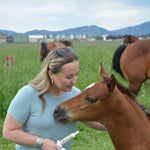3 Tips for Keeping Broodmares Healthy
May 15, 2020

Published: May 2020 | Updated: December 2022
Key Takeaways:
- An ideal horse body condition score of 6 on the 1-to-9 Henneke scale will help your mare conceive and carry.
- Stay on top of preventive care, such as vaccination and deworming schedules, to keep disease and parasites from spreading within broodmare bands.
- Add probiotics and prebiotics to help stabilize your pregnant mare’s gut microbiome as she undergoes necessary diet changes.
When you’re investing nearly a year’s worth of time and thousands of dollars to produce a foal, you better bet you’re going to make every effort to ensure your mare is in optimal shape for breeding and pregnancy.
Fortunately, owners can take a number of simple, proactive steps—from vaccination to dietary supplementation—to prepare for breeding mares.
1) Body Condition: Find That Happy Medium
Body condition, which reflects a horse’s stored body fat—not her weight—can have a significant effect on fertility. So much so that Texas A&M’s Dr. Don Henneke developed the Henneke Body Condition Scale (which ranges from 1 to 9, emaciated to obese) specifically to evaluate fat deposits in broodmares and determine the ideal body condition for reproductive efficiency. Today we use it to assess all classes of horses.
What he found is that the magic number for most broodmares tends to be 6. Significant deviations from that figure can negatively affect fertility.
“Mares that are overly conditioned or obese actually have lower fertility,” explains Dr. Rob Franklin, an equine internal medicine specialist and co-founder of FullBucket, a veterinary-strength supplement business based in Weatherford, Texas.
“Some of those obese mares have equine metabolic syndrome. And then we also see mares that are on the lower end of the body condition scale. They may be dealing with chronic disease – something that has precluded them from carrying normal body weight — that does not allow their body to cycle naturally either.”
Working with your veterinarian and equine nutritionist to keep your mare at that ideal broodmare BCS of 6 is “a great way to make sure that your mare is going to cycle and be able to conceive and carry,” Franklin says. “You don’t want an overly obese mare, and you don’t want a mare that is showing all the ribs and parts of her skeleton.”
2) Prime the Equine Immune SystemMake sure your mare is up to date on her vaccinations and deworming before and throughout the breeding season. Particularly if she’ll be living at a densely populated breeding farm, she’s likely to be exposed to a variety of parasites and other pathogens.
As your mare transitions from winter turnout to spring breeding and foaling season, she’ll need more intensive management and preventive care.
“As we start to bring them in for breeding, their routine changes, so they’re getting fed differently, they may be getting housed differently, they may be running into more and more animals that they’re not used to seeing,” says Franklin. “They’re going to be on top of each other, if you will, so they’re going to be able to spread more disease to each other, more parasites. Managing their body condition, immunizations and deworming schedules is going to be key to keeping them healthy and reproductively sound.”
3) Support the Gut with Pre- and Probiotics
The routine and diet changes that come with breeding horses and pregnancy can disrupt a mare’s digestive system. You might be taking her off full-time pasture turnout, for instance, and keeping her stalled for longer periods for exams and breeding or foaling prep. You might be feeding her a more processed or grain-rich diet as a result.
“I think we need to be conscientious of that and realize that by putting new foodstuffs in the intestinal tract we are disturbing its normal microbiome (the community of microorganisms living in the horse’s large intestine, their genomes, and their interactions) made up of living bacterial and fungal elements and protozoal elements,” Franklin says.
“We’re disturbing that by putting new types of horse feed in there.”
When you do throw her back out on pasture to graze for half a day, her body hasn’t been primed to handle all that fresh spring grass.
“Then we see them get everything from colic to diarrhea, too much weight gain, problems with their feet (such as the painful hoof disease laminitis),” he says.
“All these problems are derived from this rapid diet change that we see whenever we either are feeding them too much grain and they’re not used to that, or we’re feeding them green grass that has sprouted up quickly and is full of sugars.”
Conversely, horses in their natural state graze constantly and can adapt to new grass growth appropriately.
“New growths of grass are fine whenever you take a wild animal that’s out grazing and they are slowly getting a thaw, and they’re getting to see little pieces of green grass, and they can only consume so much of that,” Franklin explains.
“Their body begins to get used to that and, as more and more of that grass grows up, their body, their microbiome, the bacterial, fungal and protozoal elements of their intestinal tract have reacted to that in an appropriate fashion.”
When you take your mare out of that natural environment and into a stall, eating hay, you need to help her digestive system adjust.
Here’s where a step as simple as adding probiotics and prebiotics (live beneficial microorganisms and the foods that feed them) such as FullBucket’s equine probiotic pellets can benefit your mare immensely.
“We know that probiotics and prebiotics, such as our FullBucket Probiotic Pellets, stabilize the gut in the face of diet, management changes, and stresses on the immune system from multiple animals coming together,” Franklin says.
Providing your mare with beneficial microorganisms from quality probiotic supplements can help her gut stay balanced as you manage the three key elements discussed: body condition, general wellness, and diet.

